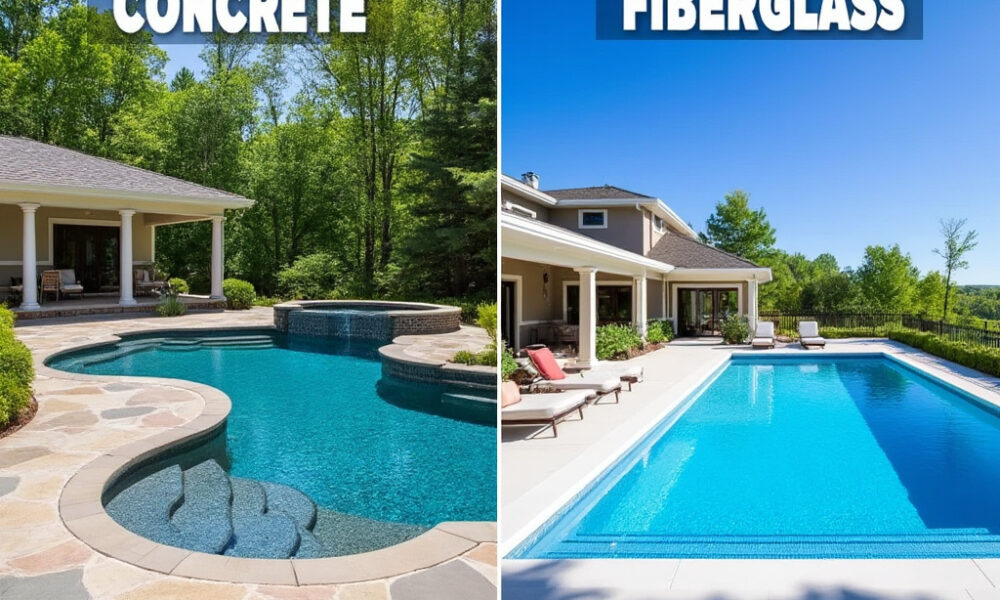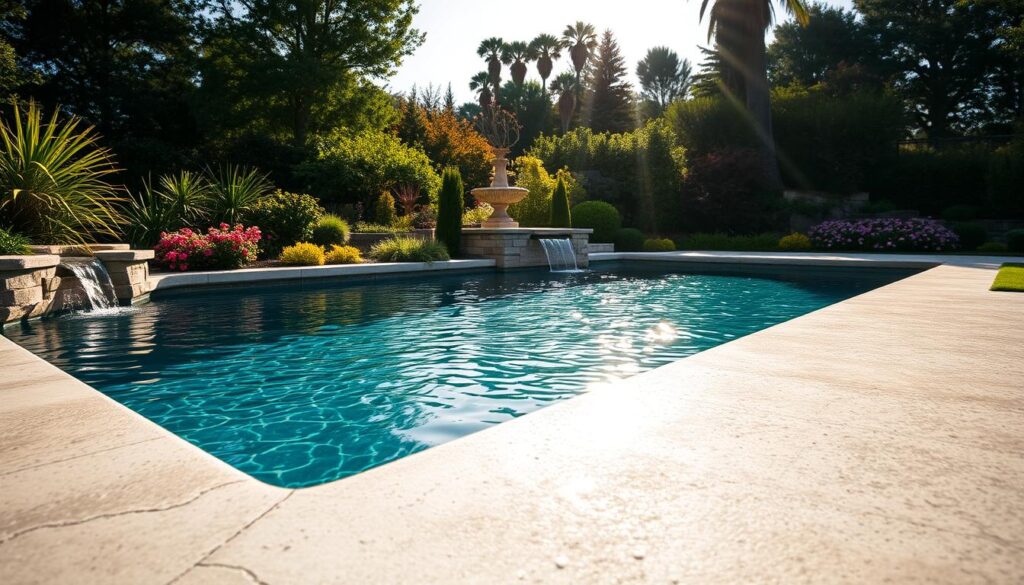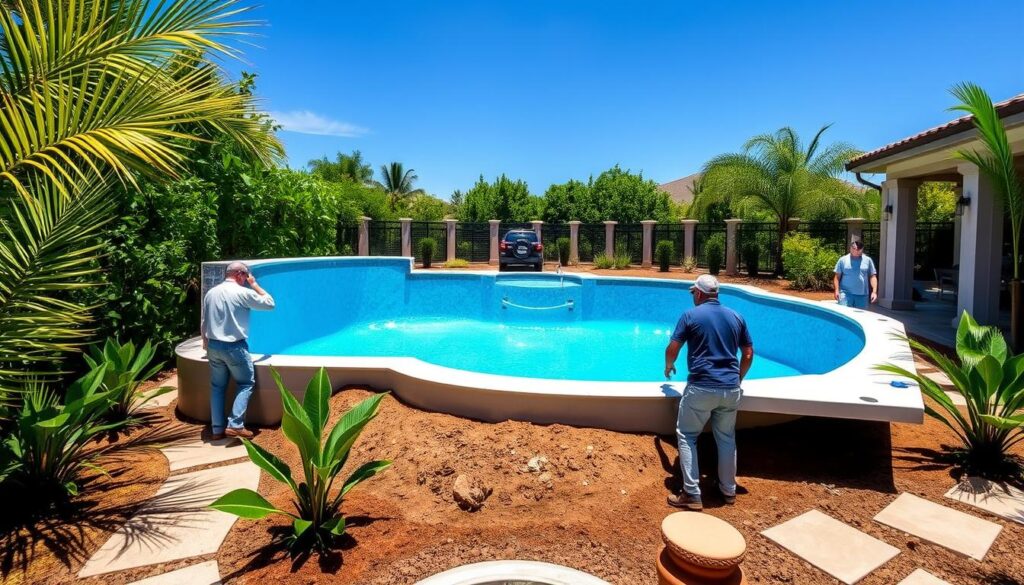
Concrete Pools vs Fiberglass Pools: Which to Choose?
Choosing between concrete and fiberglass pools is a big decision for your backyard. This article will help you understand the good and bad of each. We’ll look at things like durability, cost, and how easy they are to keep up.
Key Takeaways
- Concrete pools are very durable and can be customized, but they need more upkeep.
- Fiberglass pools are easy to maintain and quick to install, but you can’t change their design as much.
- It’s important to think about cost, climate, and what you like when picking a pool.
- Both concrete and fiberglass pools have their own benefits, so it’s key to know what they offer.
- Doing your homework and thinking about what you need will help you pick the right pool for your space.
Exploring the Advantages of Concrete Pools
Concrete pools are known for their concrete pool durability and long life. They can last for decades with the right care. This makes them a smart choice for those who want a pool that will last and look great for years.
Concrete pools also offer great concrete pool customization options. Homeowners can design pools that match their style and home’s look. You can choose from many shapes, sizes, finishes, and features to make your pool unique.

Durability and Longevity
Concrete pools are very durable and can last longer than other materials. They can handle harsh weather without losing their shape. With regular upkeep, a concrete pool can be a beautiful part of your backyard for decades.
Customization Possibilities
Concrete pools are great because you can customize them to fit your taste and home’s style. You can pick from many designs, like classic or freeform shapes. You can also choose finishes, colors, and features to make your pool truly yours.
The Benefits of Fiberglass Pools
Fiberglass pools have many advantages that make them popular among homeowners. They require little upkeep and can be installed quickly. These benefits make them worth considering.
Low Maintenance Requirements
Fiberglass pools need very little care. Their smooth surface prevents algae and stains, keeping the pool clean. Fiberglass pool maintenance is easier than other types, giving homeowners more time to enjoy their pool.
Fast Installation Process
Fiberglass pool installation is much quicker than building a concrete pool. They are made offsite and then delivered, cutting down the construction time. This is great for those who want to use their pool sooner.
Other benefits of fiberglass pools include their durability and resistance to cracking. They also offer a wide range of fiberglass pool advantages in design and customization. Homeowners should think about these pros and cons to see if fiberglass pools are right for them.

Comparing Pool Costs: Concrete vs Fiberglass
When thinking about pool costs, concrete pool cost and fiberglass pool cost have different points to consider. Concrete pools cost more upfront but last longer and can be customized more.
Fiberglass pool cost is lower at first, but you might need to fix or resurface it later. The pool installation cost and pool construction cost change based on the material, local prices, and project complexity.
Let’s dive into the cost details for each pool type:
- Concrete Pool Cost: Costs range from $30,000 to $100,000 or more. This depends on size, design, and features. Concrete pools are very customizable but harder to install.
- Fiberglass Pool Cost: Prices are between $20,000 to $50,000. You might also pay for site prep and installation. Fiberglass pools are quicker to install and cheaper to build.
The choice between concrete and fiberglass pools depends on your budget, design wants, and maintenance needs. Doing your homework and planning can help you pick the right pool for your life.
Concrete Pools vs Fiberglass Pools: Aesthetics and Design
Both concrete and fiberglass pools offer many design options. Homeowners can make their pool look great and fit their yard and house. This way, they create a special outdoor space.
Diverse Shapes and Finishes
Concrete pools are known for being customizable. You can pick from many pool shapes and pool finishes. You might want a simple rectangle or something more unique like a freeform shape.
Concrete pools also let you choose finishes like natural stone or glass tiles. This lets you make your pool truly yours.
Fiberglass pools have fewer shape options but still offer many pool finishes. They come in different colors and textures. This makes it easy to match your pool with your yard.
Whether you like modern or natural looks, fiberglass pools can fit your style. They can make your backyard look even better.
- Concrete pools offer unparalleled customization in pool shapes and pool finishes
- Fiberglass pools provide a diverse selection of pool finishes to choose from
- Both pool types can be designed to enhance the overall pool aesthetics and pool design of the backyard
Installation Processes: Concrete vs Fiberglass
Choosing between concrete and fiberglass pools involves understanding their installation processes. This knowledge helps homeowners decide what fits their needs and preferences best.
The concrete pool installation is detailed and takes longer. It starts with digging and adding steel for strength. Then, concrete is poured and cures for weeks. This method makes a strong pool but costs more time and money upfront.
Fiberglass pool installation is quicker and simpler. The fiberglass shell is made elsewhere and then brought to the site. After digging, it’s just lowered into place and secured. This makes the pool construction process faster, cutting down the project time.
Customization is another big difference. Concrete pools can be shaped and sized as you like, making your backyard special. Fiberglass pools come in set shapes and sizes, but some options are available.
Choosing between concrete and fiberglass depends on your budget, how fast you want it, and what you like. Knowing the pros and cons of each helps homeowners pick the right pool for their space.
Maintenance and Upkeep: Which Pool is Easier?
Keeping your pool in top shape is key to enjoying it fully. The choice between concrete and fiberglass pools affects maintenance. Let’s look at what makes each pool easier to care for.
Resurfacing and Repairs
Fiberglass pools are easier to maintain than concrete ones. Their smooth surface resists stains and algae, making cleaning simpler. Fiberglass pool repairs are often quick and don’t disrupt much.
Concrete pools, however, might need concrete pool resurfacing now and then. This keeps them looking good and strong. But, it’s a bigger job that takes more time.
- Fiberglass pools need less pool upkeep and cleaning.
- Concrete pools might need more pool maintenance and resurfacing for stains or cracks.
- Fixing fiberglass pools is simpler and less messy than resurfacing concrete ones.
The upkeep needed depends on your pool, how often you use it, and the weather. Knowing the maintenance needs of concrete and fiberglass pools helps you choose the right one for you.
Concrete Pools vs Fiberglass Pools: Climate Considerations
Choosing between concrete and fiberglass pools depends on your area’s climate. Each type performs differently based on local weather.
Concrete pools are great for changing pool temperature because they can expand and contract. This makes them good for places with big seasonal changes.
Fiberglass pools, however, are better for areas with earthquakes or other disasters. They’re flexible and can handle natural calamities well.
Think about your area’s pool climate considerations, pool temperature, and pool weather resistance needs. This will help you pick the right pool type for your needs and ensure it lasts long.
Pool Lifespan: How Long Do Concrete and Fiberglass Pools Last?
Both concrete and fiberglass pools have their own benefits when it comes to lasting long. Concrete pools can last for decades with the right care. Fiberglass pools, however, usually last between 20-30 years. But, many things can affect how long a pool lasts.
Factors Affecting Pool Longevity
Several important factors can influence a pool’s lifespan:
- Water chemistry – Keeping the right pH, alkalinity, and chlorine levels is crucial for a pool’s longevity.
- Climate conditions – Extreme temperatures, UV rays, and weather can damage a pool over time.
- Usage patterns – Heavy use, foot traffic, and exposure to chemicals can wear down a pool faster.
- Maintenance and care – Regular cleaning, repairs, and preventive actions can help extend a pool’s life.
Knowing these factors and taking steps to address them can help pool owners make their investment last longer. This applies to both concrete and fiberglass pools.
Choosing the Right Pool for Your Lifestyle
Choosing a pool is more than just picking a design. It’s about fitting the pool to your lifestyle and goals. Let’s look at what to consider when picking a pool.
Your budget is key. Concrete pools cost more upfront but last longer and can be customized. Fiberglass pools are cheaper and quicker to install, perfect for those on a budget.
Think about how much maintenance you want. Fiberglass pools need little care, great for busy people. Concrete pools are durable but need more upkeep over time.
The look you want is also important. Concrete pools can be shaped and finished in many ways to match your yard. Fiberglass pools offer modern looks and a few color choices.
Consider your long-term plans for your home. Concrete pools can increase your home’s value if you plan to stay. Fiberglass pools are better for those who might move soon or often.
By considering these points, you can choose a pool that fits your lifestyle and budget. Whether you pick a durable concrete pool or a low-maintenance fiberglass one, your backyard will be amazing.
The right pool enhances your enjoyment and property value. Take your time to choose wisely. You’ll create the perfect backyard retreat.
Conclusion
Choosing between a concrete pool and a fiberglass pool depends on your needs and preferences. Both have their own benefits for different lifestyles and budgets. Knowing the differences helps you decide on the perfect backyard oasis.
Do you want a durable concrete pool or a low-maintenance fiberglass one? Baytown Custom Pools can help. They offer pool recommendations based on your needs. Their quality installation ensures your pool will enhance your outdoor space.
Ready to start your pool journey? Contact Baytown Custom Pools at (346) 567-6456 for a free quote. They’ll help turn your backyard into a perfect retreat that fits your lifestyle.

